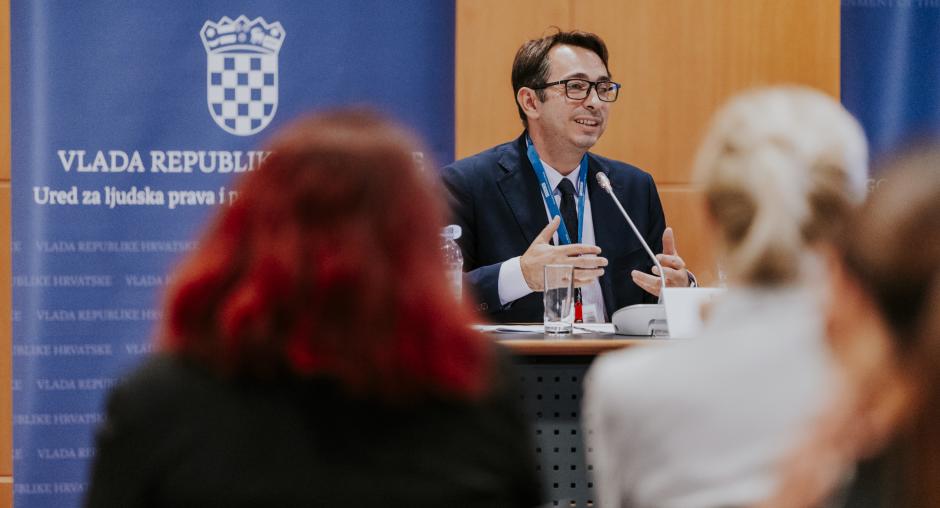Roundtable on sustainable supply chains marks EU Anti-Trafficking Day in Croatia

On 18 October, the Office for Human Rights and Rights of National Minorities of Croatia, the OSCE Office of the Special Representative and Co-operation for Combating Trafficking in Human Beings, and the UN Global Compact Network Croatia marked EU Anti-Trafficking Day with a pivotal roundtable discussion in Zagreb on supply chains and human rights. The event, titled 'Sustainable Supply Chains: Promoting Human Rights and Social Responsibility', was a landmark occasion that brought together the public and private sectors to discuss human rights in global supply chains, with a particular focus on combating human trafficking for labour exploitation in the context of the new EU Corporate Sustainability Due Diligence Directive (CSDDD).
Convening 30 participants from diverse backgrounds, including representatives from businesses, government agencies, international organizations, academia, and civil society, the roundtable was a testament to the widespread interest in the topic. Their collective engagement in discussions on preventing human rights abuses and ensuring environmental sustainability in supply chains underscored the broad commitment to this critical issue.
“In order to enhance awareness of the phenomenon of labour exploitation and to formulate an appropriate response to the emerging situation, the Government of the Republic of Croatia is committed to strengthening the collaboration between the private and public sectors through joint initiatives and the involvement of the private sector in shaping public policies,” said Alen Tahiri, National Anti-Trafficking Coordinator of Croatia. “Public-private partnerships are crucial for identifying and mitigating the risks of labour exploitation.”
Additionally, the CSDDD requires the Croatian government to amend several national laws, making this event a timely opportunity to discuss the challenges faced not only by businesses required to comply, but also by governments that must implement these changes.
According to the UN Global Compact Croatia Network, the roundtable discussion is just the beginning, serving as a platform for ongoing co-operation between the public and private sectors on human rights issues.
Vali Marszalek, Board Chair of the UN Global Compact Network Croatia and ESG Director for the Adria Region at Forvis Mazars, emphasized that while companies are currently focused on sustainability reporting, a crucial shift towards evaluating business behaviour is needed. “With the new directive in effect, businesses must scrutinize their operations and entire chains of activity, recognizing that they cannot distance themselves from negative impacts,” she said.
Boris Topić, National Anti-Trafficking Officer at the OSCE Mission to Bosnia and Herzegovina, underscored that “the OSCE is walking the talk when it comes to ethical supply chains and has implemented several measures in its own operations and procurement processes. We are excited to see the next steps that Croatia will take as a joint effort from the public and private sectors toward the implementation of the CSDDD, and we stand ready to support Croatia in this endeavor.”
Discussions underscored Croatia's ongoing commitment to high human rights standards, including efforts against trafficking and labour exploitation. By sharing insights and best practices, the roundtable fostered collaborative efforts to enhance compliance and enforcement of due diligence legislation, reinforcing the importance of responsible business conduct for the benefit of all employees in the country.
